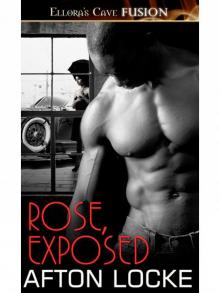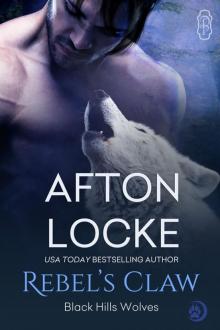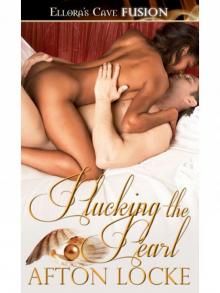- Home
- Afton Locke
Sadie's Surrender
Sadie's Surrender Read online
Sadie’s Surrender
by
Afton Locke
After her husband leaves her for a prettier woman, Sadie Johnson feels unattractive. Unable to face a dreary future of shucking oysters and living with her critical mother, she dreams of being a businesswoman. But in 1936, opportunities for women of color in Oyster Island are limited.
An oysterman at heart, Henry Rockfield would rather sail than run the local branch of his brother’s oyster company. He’s not happy about belonging to the town Klan either, but he’ll do anything to keep the peace and help his family.
When sassy Sadie proves she can run the plant, he can’t resist putting her secretly in charge so he can return to the water. But when desire resurrects a tragic mistake from his past, he learns business and pleasure are a dangerous mix. When racial conflict hits home, forcing them to choose between love and duty, who will surrender?
Table of Contents
Chapter One
Chapter Two
Chapter Three
Chapter Four
Chapter Five
Chapter Six
Chapter Seven
Chapter Eight
Chapter Nine
Chapter Ten
Chapter Eleven
Chapter Twelve
Chapter Thirteen
Chapter Fourteen
Chapter Fifteen
Chapter Sixteen
Chapter Seventeen
Chapter Eighteen
Oyster Harbor Series
About the Author
Connect With Me
SADIE’S SURRENDER
by Afton Locke
Copyright © 2015 Afton Locke
SADIE’S SURRENDER © 2015 Afton Locke. ALL RIGHTS RESERVED. No part or the whole of this book may be reproduced, distributed, transmitted or utilized (other than for reading by the intended reader) in ANY form (now known or hereafter invented) without prior written permission by the author. The unauthorized reproduction or distribution of this copyrighted work is illegal, and punishable by law. The characters and events portrayed in this book are fictional and or are used fictitiously and solely the product of the author’s imagination. Any similarity to real persons, living or dead, places, businesses, events or locales is purely coincidental.
Edited by: Wizards in Publishing
Cover designed by: EDH Graphics
Dedication
This story is first dedicated to the readers of the Oyster Harbor series. After I wrote the first two books, my muse got pulled in other directions and I was given two group writing opportunities I had to take advantage of. Hard as I tried, I couldn’t quite feel the sparks between Sadie and Henry. Even though it had been a year and a half since the last release, readers reminded me they were still patiently waiting for this story. We even chatted about it while I was promoting another release. So, thank you for waiting!
My second dedication is to Richard and Mildred Loving. The bravery of this interracial couple led to the US Supreme Court decision that ended state anti-miscegenation laws. These laws had made mixed-race marriages in states like Maryland illegal for years.
Chapter One
Oyster Island, 1936
When Jonathan Carter marched out the verandah doors, he found the mayor leaning back in a recliner, facing the water view of Oyster Harbor. The warm spring air must have tempted him to nap the day away, or maybe he’d had too much to drink again.
“Wake up, Father. You’ll never believe what I’m about to tell you.”
“Don’t be in such a rush. Sit down.”
Jon perched on the nearest table. “Pearl Rockfield is going to deliver a half-breed. I saw her in St. Mary’s County. She’s bigger than a whale.”
The mayor frowned. “Do tell.”
“Don’t you care? She’s been married to Caleb Rockfield for a while.”
When the man had managed the oyster house here, he’d acted like king of the whole town. The Klan had put an end to that.
“I’m well aware of that fact.”
“Well, it’s time to do something about it.” Jon stamped his foot. “He’s white and she’s colored, and they have no business being married. They’re breaking Maryland’s anti-miscegenation law.”
The other man yawned. “As long as they’re not living in my town, I don’t give a damn if she has triplets.”
Jon peered into his eyes. “Are you ready to retire already?”
His father straightened his short, heavy body in his seat. “You’d like that, wouldn’t you?”
“You don’t seem to care about the things that matter.”
“I care about getting roads built to bring more money into this town.” His fist thumped the arm of his chair. “The prosperity of Oyster Harbor has been my main concern and always will be.”
“Then why aren’t you breaking ground instead of sitting there?” Jon asked.
“You’d better treat me with respect, boy.” His father stood and glared at him. “Don’t you worry. I’ve got my eye on Henry Rockfield. The minute he does something wrong, I won’t hesitate to send the law after his brother.”
Jon smiled for the first time all morning. “Glad to hear it. I’ve got my eye on him, too.”
“I wouldn’t hold my breath, though,” the mayor added. “He hasn’t done anything wrong so far, and he is one of us. I don’t believe he’s ever missed a Klan meeting.”
“He’s not one of us,” Jon drawled. “He’s just pretending to be. I’m going to enjoy watching him finally crack and reveal his true colors.”
* * *
Sadie Johnson stabbed the oar into the water and grunted from nausea. Why did the marsh smell so strong today?
“You sick again, child?” Mama asked.
“Uh-huh.” Sick of paddling down Crab Creek to her wretched job shucking oysters at Rockfield’s.
“You ain’t with child, are you?”
Sadie’s eyes rolled up in her head. “How could I be? My husband left me last summer.”
She almost wished she was, though. A baby would get her mind off the drudgery of her life. After Buck left, she’d moved back home. With Papa dead and Leroy living down in Pearl Point with his wife, Rose, her mother would otherwise be all alone.
After fighting the bitter wind all winter, she should be grateful for the soft hint of spring in the air. Row. Row. With each lunge of the blade, Sadie willed her stomach to settle. How could her mother stand this life, day after endless day, year after soul-numbing year?
She loved Mama, but she didn’t want to be Mama.
“I know what’s ailing you,” the woman said from the back of the boat. “Your body’s changing, tellin’ you it needs to have a child.”
Fat chance of that. Sadie didn’t even bother looking in the mirror anymore. She’d never be as pretty as her slender, green-eyed cousin, Pearl. The woman had snagged herself a big gem—handsome, white Caleb Rockfield, the head of Rockfield Oyster House. They even had a baby on the way.
Miss Perfect had worked as a shucker for only a few months before finding a real pearl, too. Sadie had slaved away since she was a teen, and all she had to show for it were aching feet and the stench of seafood engraved on her brain.
“Ouch.”
Sadie’s oar paused in midair. “What is it, Mama?”
“Just my rheumatism.”
Her stomach pitched as if they were in the middle of a storm. The woman grew grayer and thinner each year. Her working years were numbered. After that, Sadie would have to take care of her until her own body grew as old and broken as her mother’s.
Why did life have to be so damn hard?
“I want to go to business school,” she blurted out.
“You?” Mama chuckled. “Ain’t none of them kind of schools for colored girls.”
A seagull zoomed over the marsh bushes and grabbed a fish, creating ripples.
“Maybe I’ll be the first.”
She’d gotten the idea from a magazine ad she’d seen the previous week. The girl, wearing a spotless dress and a bow in her hair, sat at a fancy desk in a clean office. Best of all, she got to use her mind instead of wearing out her body. Sadie had done well in school, especially at arithmetic. She even managed her mother’s finances. Not that there was much to manage.
“Well, I’m going to look into it,” she insisted. “I can’t shuck oysters the rest of my life.”
Mama answered with a rusty laugh. “I said the same thing when I was young. You’ll get used to it.”
I don’t want to get used to this miserable life. Ever!
The white, sprawling building of Rockfield’s, her oyster prison, loomed ahead. Maybe she’d get a glimpse of Henry Rockfield today. He’d been running this branch since his brother, Caleb, moved to Pearl Point in the next county to start his own oyster house.
In her opinion, the rough-around-the-edges waterman was more handsome than his brother. Caleb’s body, hair, and face were lean, clean, and angular, but Henry’s tousled brown hair begged to be fingered. His muscular arms and broad shoulders testified to the anchors and winches he’d wrestled. And his rounded, stubble-covered cheeks were a fascinating blend of cherub and raw male. She itched to stroke them at least once.
Every time he got off a boat, he whistled or hummed a sea tune. What she liked best was how he smiled and chatted with everyone, as if the workers were his equals. Lately, though, his dead eyes, stooped shoulders, and downturned mouth struck a chord in her. He must hate his job as much as she hated hers.
Even though she had a greater chance of becoming the nation’s president than getting him to notice her, he was the only thing keeping her from throwing herself overboard.
He was also a member of the local Klan. She needed to remember that and keep her distance.
* * *
Henry Rockfield clenched his fingers into a fist as he stared out the open window of his office at Rockfield Oyster House. Caleb’s office. His older brother belonged here, not him. The metal filing cabinets, black around the edges, were the only evidence of the fire, but the paneled room looked half-finished. No one had bothered to replace little details like the molding or window blinds.
His lips turned up as he stared at the boats bobbing in the harbor. The promise of spring filled the air. No more bitter winds and rough surf. Today was a sailor’s dream. If he wasn’t stuck running this place, he’d be out on a boat, tonging for oysters and checking on the seed beds of the baby ones.
Instead, a headache gathered behind his brows. Caleb was due here any minute for another status meeting. Why bother? Every time he visited, he criticized everything Henry tried to keep this place afloat. Caleb had every right to be critical. Henry had no talent for running businesses. He would never be as perfect as his brother.
Caleb finally arrived, filling the office with his tall, commanding frame. He’d obviously received spring’s signal, too, because he wore his straw boater hat over his short, dark hair. He hung it on a hook beside Henry’s old boating cap, which was festooned with fishhooks and bobbers. He hadn’t worn it in so long, it probably had an inch of dust on it.
Henry offered him some coffee and pastries, hoping refreshments and some personal conversation would stall the business discussion.
“Has the baby come yet?”
“Pearl’s as big as a house.” Caleb’s blue eyes danced with pride as he sat in the guest chair. “It’ll be any day now.”
“I can’t wait to become an uncle. I hope it’s a boy so I can teach him how to sail.”
Because the child would be mixed-race, he or she would need as many skills as possible to survive in this cruel world.
“Enough about my life.” Caleb wiped coffee from his small moustache. “How’s it going here?”
Same as always. Lousy.
“Well, the same, I guess.” Henry rustled some of the jumbled papers on his desk. “This winter’s harvest wasn’t as good as I hoped.”
“Similar story at my plant,” Caleb echoed. “So what’s your total profit for last year?”
Hell if he knew. He’d wrestled with numbers all last night until his vision blurred and his head hurt. Each sum he came up with was even more negative than the one before.
“W-well, I’ve been working on that.” He squeezed his fingers together until they were bloodless. “I need more time.”
“How much time?” Caleb glared at the desk. “I don’t see how you can calculate anything from that mess.”
“I can’t do this anymore.” The sentence, spoken in a soft voice, drifted through the room. Had he really said it?
“I’d run it more myself, but the baby will keep me busy.” Caleb rubbed his forehead. “Damn it. I was really counting on you.”
“I’m sorry.” Henry bowed his head and covered it with his hands. “I’ll try harder.”
Caleb set his coffee cup down on a heap of papers. “I don’t think it’ll help. I guess we need to hire a manager.”
Henry wished the floor would open up and dump him into the sea.
“Won’t that make the loss even bigger? I mean, eat into the profits? And I know how much you want to keep the business within the family.”
“I don’t think we have a choice,” his brother replied. “It’s okay. I know you tried your best.”
But it wasn’t good enough. It never was. Caleb had always excelled at school and sports, and he was more handsome, too. Even their parents had preferred their older child.
“Give me another chance. I can do this.” As if to prove it, he scrambled to straighten the papers.
Caleb raised an eyebrow. “Henry, we have to face reality.”
“One more chance.” He stood and stepped around the desk. “I won’t let you down. Please.”
“All right.” Caleb squeezed his shoulder. “One month. No longer.”
“Thanks,” Henry said as he sat down again.
“I’ve got to get back to Pearl Point.” Caleb eyed the messy desk. “I’m afraid I don’t have time to help you with this today.”
Henry laid his palms on the nearest jumble. “Straightening these papers is the next thing on my list.”
Caleb pointed to the leaning pile of business books on the corner of the desk. “Were these any help?”
The breath caught in Henry’s throat. “Well, I looked through them. I’ll study them more. Number two on my list.”
He couldn’t admit the words tangled into a bigger mess than his desk when he tried to read them. But he would try again and even take notes. He was not about to be a failure.
“Good luck.” Caleb donned his hat and strode out the door.
Henry stared out the window with more longing than ever. Part of him needed to run to the pier and hop onto the nearest boat. Anything to escape this prison…this hopeless situation. Why hadn’t he admitted defeat like a man? By insisting on another chance, he’d probably run Rockfield’s into a larger hole than it was already in.
He glared at the papers. He could straighten them, but forget making sense of them. And he sure as hell couldn’t make sense of those fancy books. The more he read them, the more confused he got. Only a miracle could save him.
After dragging himself to his feet, he stepped out of the office to survey the shuckers laboring below. Each stood inside a personal wooden stall to protect the feet and legs from piles of discarded oyster shells. They worked so hard every day, struggling to feed their families and keep roofs over their heads. If the plant shut down, it would cause a lot of hardship. They depended on him. All of them.
His attention drifted to Sadie Johnson, who worked beside her mother. Buck, her ex-husband, didn’t work here any longer. Thank goodness. The man had
been a fool to let a vibrant woman like her go. Although her dark-gray skirt and lighter-gray blouse matched the concrete room, the other workers faded into the background as he studied her body. The way her flared hips tilted to one side, as if to ease a crick in her back. The way she wiped her eyes with the back of her arm.
Was she crying? He admired how openly she wore her emotions. If only he could be so honest and free—with his brother, the town, himself. Why couldn’t he pull his eyes away from her? At least his preference for women outside his race was something he had in common with Caleb.
His heartbeat quickened when she gazed up at the ceiling and shook her head as if looking for strength she didn’t find. She was clearly as miserable as he was.
His arms tingled, itching to draw her soft, curvy body within them. To shelter and hold her until her problems melted away. Then, maybe his own burdens would lighten. He’d never be able to touch her except in his mind. She was black. He was white. He also belonged to the Klan, one of the costs of doing business in Oyster Harbor.
Although she looked miserable now, living on the street would be even worse. He had to save this place. For her.
* * *
On Saturday, Sadie disembarked from the steamboat she’d taken to Baltimore. She’d carefully pinned every hair to her head and made sure the shawl collar of her tan Sunday dress lay neatly in place. Hopefully, she wouldn’t throw up on it from nerves and seasickness. With luck, the ride back wouldn’t be as windy, either.
Mama had begged her not to go, predicting a bunch of doors would slam in her face.
“Save yourself the humiliation and stay home,” she’d said.
She was probably right, but Sadie had to try to break out of oyster-shucking hell. And she didn’t want to be a maid, either. Gripping the list of business schools in her sweating hand, she walked to the nearest one.
With her heart thudding against her ribs, she climbed the brick steps to the front door of the brick building. After stepping inside, she marveled at the quiet cleanliness. How nice to sniff a nose full of nothing instead of stinky oysters. A chalkboard listed a schedule for stenography, typewriting, and accounting lessons.

 Sadie's Surrender
Sadie's Surrender Hidden Moon
Hidden Moon Rose, Exposed
Rose, Exposed Alpha in Disguise
Alpha in Disguise Rebel's Claw
Rebel's Claw PluckingthePearl
PluckingthePearl Peak Energy
Peak Energy